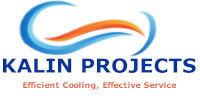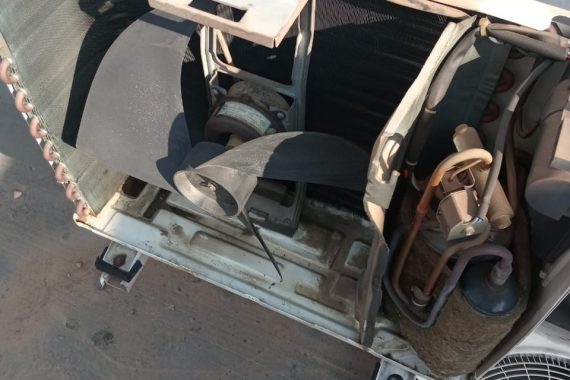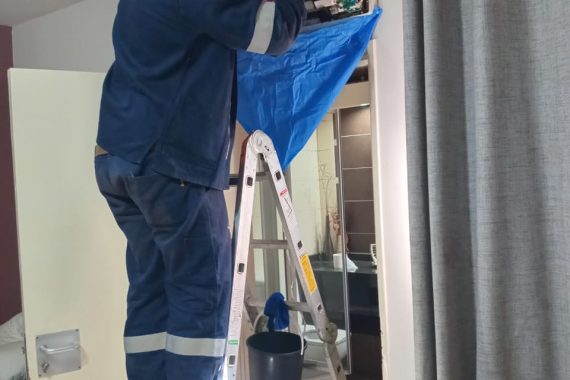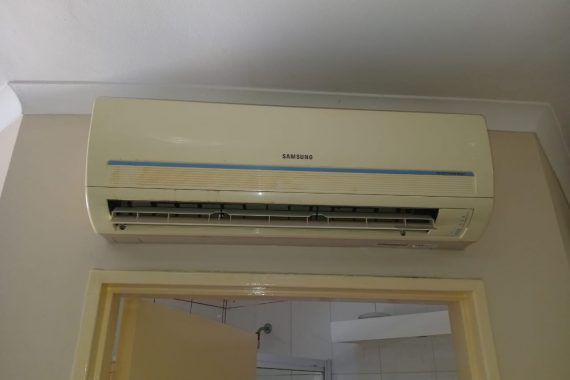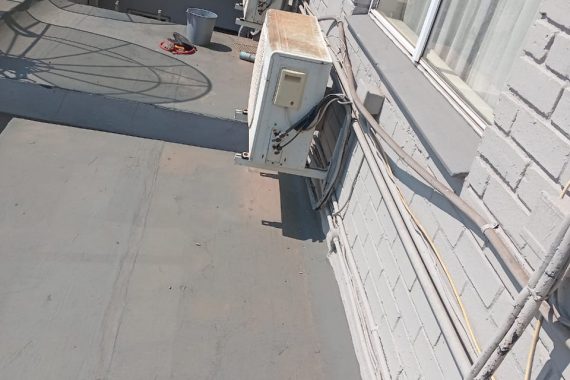Service To Air Conditioner Units For A Hotel
Project # 98 AC Service and Repairs
Project
AT A GLANCE
| Project Type | Split Unit Air Conditioner Service |
| Client Location | Johannesburg |
| Duration | 2 days |
| Project Size | 22 Split Unit air conditioners |
Scope Of Work
Objective:
The objective of this scope of work is to outline the services to be performed for the maintenance and servicing of 22 split unit air conditioners.
Scope of Services:
1. Inspection and Diagnosis:
– Inspected each air conditioning unit for any signs of wear, damage, or malfunction.
– Diagnosed any issues with the units, including problems with airflow, temperature control, or refrigerant levels.
2. Cleaning and Maintenance:
– Cleaned the condenser coils, evaporator coils, and filters to ensure optimal airflow and efficiency.
– Checked and cleaned the condensate drains to prevent water damage and ensure proper drainage.
3. Refrigerant Check:
– Checked refrigerant levels and top up as necessary to ensure efficient cooling.
– Inspected the system for any refrigerant leaks and repair as needed.
4. Electrical and Mechanical Checks:
– Inspected electrical connections and components for any signs of wear or damage.
– Checked the operation of fans, motors, and compressors to ensure they are functioning correctly.
5. Performance Testing:
– Tested each unit to ensure it is operating at the specified temperature and airflow rates.
– Verified that the units are functioning correctly and efficiently.
6. Reporting and Recommendations:
– Provided a detailed report outlining the condition of each unit, any issues found, and recommendations for future maintenance or repairs.
Deliverables:
– A comprehensive report detailing the condition of each air conditioning unit.
– Recommendations for any necessary repairs or upgrades.
–
Timeline:
The servicing of the 22 split unit air conditioners is expected to be completed within 2 days, depending on the complexity of the work and the availability of parts.
Our client is a reputable luxury hotel chain with a portfolio of top-star properties and restaurants across the country, known for its clean and nicely appointed rooms, exceptional service, and commitment to excellence. With multiple locations in prime areas, they cater to a diverse clientele of business travelers, tourists, and locals, and have established themselves as a leader in the hospitality industry through their dedication to quality, comfort, and customer satisfaction.
During the servicing of the air conditioners, our team encountered several challenges due to the units not having been maintained for an extended period. The main issues included faulty compressors resulting from refrigerant gas leaks, heavily blocked filters that compromised airflow, broken fan motors that hindered system performance, and damaged PCBs (Printed Circuit Boards) that affected unit operation. These malfunctions required thorough repairs and replacements to restore the units to optimal working condition.
1. Refrigerant Recharge: Refilled refrigerant gas to optimal levels to restore compressor functionality and ensure efficient cooling.
2. Filter Cleaning/Replacement: Cleaned or replaced blocked filters to improve airflow and system performance.
3. Fan Motor Replacement: Replaced broken fan motors with new ones to ensure proper air circulation and cooling.
4. PCB Replacement/Repair: Replaced or repaired damaged PCBs to restore unit operation and functionality.
5. Comprehensive Testing: Conducted thorough testing to ensure all units were functioning correctly and efficiently after servicing.
1. Enhanced Performance: Units operate efficiently, providing consistent cooling and improved airflow.
2. Increased Reliability: Repairs and replacements reduced the likelihood of breakdowns and system failures.
3. Energy Efficiency: Optimized systems consume less energy, leading to potential cost savings.
4. Extended Lifespan: Regular maintenance and repairs extended the lifespan of the air conditioning units.
5. Improved Guest Comfort: Consistent and reliable cooling ensures a comfortable environment for hotel guests.
